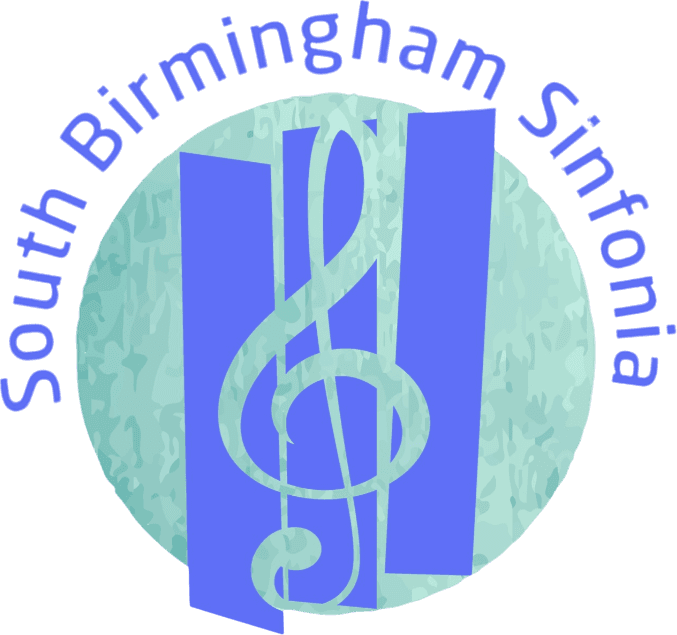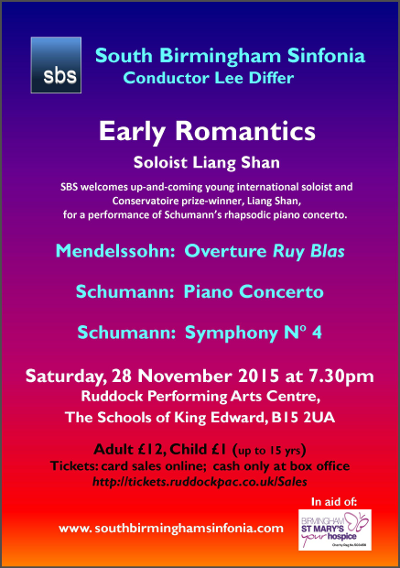28th November 2015, in the Ruddock Performing Arts Centre
As part of an exciting new venture with the Birmingham Conservatoire and the prizewinners on the Conservatoire’s internationally renowned Advanced Postgraduate Diploma programme, South Birmingham Sinfonia’s Autumn 2015 concert featured the up-and-coming young international soloist, China’s Liang Shan in a performance of Schumann’s Piano Concerto.
The concert also featured the popular fourth symphony by Schumann, and was started with the overture written by Mendelssohn for Victor Hugo’s play, Ruy Blas.
Conductor: Lee Differ
Programme Notes
Mendelssohn’s overture “Ruy Blas”
Mendelssohn’s full name was Jakob Ludwig Felix Mendelssohn Bartholdy. He lived from 3 February 1809 to 4 November 1847 and is widely known as Felix Mendelssohn. He was a German composer, pianist, organist and conductor of the early Romantic period. As well as being of importance in his own right, he also revived interest in the music of Johann Sebastian Bach, and travelled extensively throughout Europe, including Scotland and England, where his music was well-appreciated.
Mendelssohn wrote five symphonies, various concertos, oratorios, piano music and chamber music. His best-known works include his Overture and incidental music for A Midsummer Night’s Dream, the Italian Symphony, the Scottish Symphony, the overture The Hebrides, and his Violin Concerto. He is one of the most popular and important composers of the early Romantic era.
In 1839, Mendelssohn was commissioned by the Leipzig Theatre to write an opera for Victor Hugo’s play Ruy Blas, a play that was first performed the year before. Mendelssohn apparently hated the play, and wrote the overture under extreme pressure (he had received the commission only 6 days before the opening night), but somehow or other overcame all these problems to produce a fine and highly inventive work.
The opening brass chorale may perhaps be a depiction of the court, whilst the remainder of the piece brings to mind the tempestuous and romantic aspects of the play. Mendelsson’s ending strays from Victor Hugo’s version, choosing a heroic finale rather than the hostile conclusion of the original.
See also Wikipedia articles: https://en.wikipedia.org/wiki/Felix_Mendelssohn
https://en.wikipedia.org/wiki/Ruy_Blas
Schumann’s Piano Concerto in A minor
The Piano Concerto in A minor, Op. 54, is an expansion of an earlier fantasy for piano and orchestra. Schmann’s pianist wife, Clara, urged him to expand this to a full piano concerto. The concerto was completed in 1845 by adding an intermezzo and finale, and premiered in Leipzig on 1st January 1846 with Clara Schumann playing the solo part.
See also Wikipedia article: https://en.wikipedia.org/wiki/Piano_Concerto_%28Schumann%29.
Schumann’s Fourth Symphony in D minor
The Symphony No. 4 in D minor, Op. 120, by Robert Schumann, was first completed in 1841. Schumann heavily revised the symphony in 1851, and it was this version that is usually heard.
The 1851 (revised) version replaces the Italian markings with markings in German and is in four movements, usually played following each other without pause.
- Ziemlich langsam [fairly slow] – Lebhaft [lively] (D minor)
- Romanze: Ziemlich langsam [fairly slow] (A minor)
- Scherzo: Lebhaft [lively] (D minor)
- Langsam; Lebhaft [lively] (D major)
See also Wikipedia article: https://en.wikipedia.org/wiki/Symphony_No._4_%28Schumann%29

